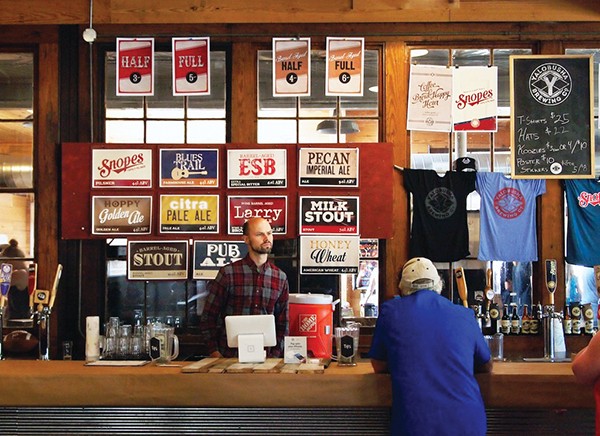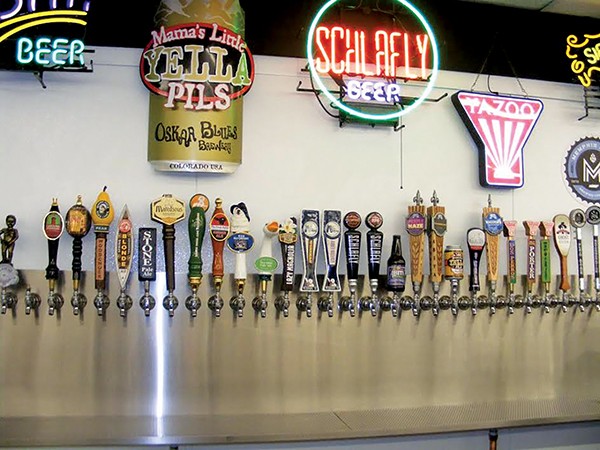On the afternoon of July 1st, I drove into a changed Mississippi under gray clouds that foretold a fine summer rain. Some 15 hours earlier, at precisely midnight, that state’s House Bill 1322 went into effect, allowing for legal existence of that wonderful institution beer lovers in Tennessee have taken for granted for so long: the brewery taproom.
Until that day, the nine breweries in Mississippi could only sell their product through a distributor, on tap through restaurants and bars, and in package. They weren’t allowed to sell it onsite, but could offer paid brewery tours that gave away free samples. It was a measly loophole that didn’t encourage visitors to hang around and hoist a few.
Now all that has changed. Granted, Mississippi has not been on the cutting edge of the craft beer industry. Only Georgia — despite big, cosmopolitan Atlanta — still doesn’t allow on-premise sales at breweries. Back in 2013, Mississippi became the 49th state to allow home brewing. But this is Mississippi, so, all things considered, coming in 49th out of 50 is like winning the silver. (Lucky Town Brewing in Jackson, has released a brew called Old No. 49 Farmhouse Ale to commemorate the “victory.”) So it was that Mrs. M and I — under those cloudy skies and with R.E.M. on the stereo — went down to Water Valley, a little Oxford bedroom community. Along with the other eight Mississippi breweries, the Yalobusha Brewing Company was celebrating the long overdue HB1322. Located in what Water Valley calls downtown, Yalobusha has staked out a great spot in the former Hendricks Foundry building, connected to a small coffee shop by an even smaller games arcade. Flanked on either side of the building were food trucks offering tacos and a pizza stand. It’s neat.

Yalobusha Brewery
There, over two great offerings from Yalobusha — its wonderfully named Snopes Pilsner and Blues Trail Farmhouse Ale — was as good a place as any to consider the implications of the three-year political slog it took to pass a law with a lot of economic upside and little to no downside. After all, there are a lot cheaper and quicker ways of getting into drunken foolishness than drinking craft beer at a homegrown brewery. But Mississippi was the first state to pass prohibition and the last to repeal it, so its relationship with alcohol is complicated.
Which has given brewers that much more to celebrate. Theirs is a business with pretty thin margins after everyone involved has taken their bit. The general rule of thumb among the brewers with whom I spoke was that each barrel sold on premise (without a middle man) generates about $1,000 of much-needed revenue. Sell enough of those, and you start making new local hires to deal with the demand.
The legal fight was largely spearheaded by Jackson attorney Matthew McLaughlin, who is also the executive director of the Mississippi Brewers Guild. McLaughlin expects the number of breweries in the state to double over the next 18 to 24 months. “It, in theory, lowers the risk of new products that they [brewers] want to introduce, because they have the opportunity to test in a taproom.”
Low-risk testing leads to more innovation, which leads to more products and growth which, politics aside, ought to be pretty straightforwardly a positive outcome. Breweries are embracing their new freedom in different ways. For the moment, Yalobusha is all about the beer, letting the local pizza place and food trucks handle the suds-sopping pub grub aspect.
The Lazy Magnolia Brewery, in Kiln, is adding a small kitchen to its works in order to make it a destination brewpub. If you’ve never heard of Kiln, Mississippi, don’t worry, few have. Apparently, that includes the global satellite communication system. The website offered directions and a helpful warning that if you put their address in GPS, you will get lost.
Which sounds like a road trip I’m just going to have to take.

